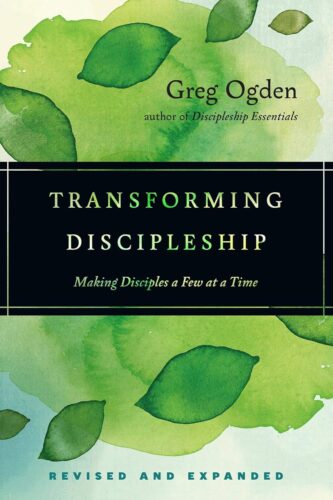 Discipleship by Popularity?
Discipleship by Popularity?
Author: Greg Ogden
In Transforming Discipleship author Greg Ogden sells his own program, focused on creating a “micro-group” of Christians who effectively disciple one another to grow in faith and Christlikeness. Honestly, this isn’t the type of book or subject that I would normally pick up, but it was assigned reading for the C.S. Lewis Fellowship year-one program. This program has encouraged and challenged me to deepen my own faith, and it has even pushed me outside of my hermit’s comfort zone. So, I approached this book with an open mind, if not a burning desire.
It starts well enough. Ogden shows what is lacking in the church overall – how the focus is on conversion with little to no resources available for those same converts to continue growing and maturing. The data seems trustworthy, and Ogden’s points about areas where the church could and should improve have a certain resonance. The call to action, then, is effective.
However, Ogden never truly defines discipleship in a succinct, easy to understand way. Instead, he proposes a problematic comparison. He argues that Jesus established the twelve apostles as an example of discipleship. Instead of spending His time with the many, Jesus instead focused on a “small” group, preparing them to take over his mission upon His death and resurrection, going forth to all nations.
The problem – well, there are many.
First, the gospels do make a clear distinction between the apostles and Jesus many (read hundreds) of disciples. Apostles are nowhere else created in the Bible (except the replacement of Judas, arguably). It was a one and done group creation. Likewise, Ogden emphasizes that an ideal group size is three to four . . . . not twelve . . . so, there’s that discrepancy that is never addressed.
Second, Ogden proposes that with this intimate group dynamic, Jesus effectively prepared the apostles to pick and teach others after His death and resurrection. The Bible, however, tells an entirely different story, showing the apostles struggling after Jesus’ death and even after His ascension. The early church (the Book of Acts) shows the apostles figuring things out along the way. They hardly came across as the prepared, cool-headed, trained disciple makers Ogden envisions.
Another of my problems with this text is, admittedly, purely personal. This idea of finding and disciplining other Christians in a close micro group of three or four reads more to my introverted self like a popularity contest. In other words, the better a Christian/disciple you are, the more friends you have for these weekly group meetings, the more invited out you get, the bigger your network, etc. Are we back to Myspace’s “Top 8.”
Not all of us are social to a fault. Some of us aren’t gifted in that way, and don’t even particularly learn well that way. The thought of these weekly confessional meetings just drains my social battery reading about it, and it also makes me wonder about a propensity towards legalism and group think. Does being a good Christian/disciple really mean that your social network is extensive and that it leads the way we think and react? Yet Ogden is stringent that there is no other way. If you go-it alone, join programs, rely on your pastor/priest, etc. then you’re not going to make it as a disciple. You’re a baby Christian with no hope of maturing. But is this one-size-fits-all proposal so cut and dry? Doesn’t the Bible itself show many different disciples engaging with Jesus, with one another, and with the apostles in many different ways?
Admittedly, Ogden doesn’t dismiss the usefulness of self-study, sermons, preaching, etc. But the assignment seems harsh to those of us who are not socially gifted or who mature better through other means. I couldn’t get together a group of three to four people once a week to save my life, and I suspect others, even those amazing extroverts, might have trouble getting an A+ on this assignment. Likewise . . . when does it go from a godly group to a cluster of friends just having fun/socializing? When does it transform from church to clique? How do you keep it godly instead of being just a good time?
Now, to be fair, however, there is some viability in Ogden’s proposal. I just don’t think it’s the only way; but there still is some good material here. The C.S. Lewis program itself evidently follows a modified version of Ogden’s plan, providing and requiring fellows with micro groups (which meet monthly – NOT weekly), mentors, preaching, programs, and self-study. The way the C.S. Lewis institute does this micro group approach, alongside a host of other things, not stressing it as the only way, but just another helpful way to grow, aligns far more with my personal preferences. However, I admit that I’ve found the micro groups the least useful and least focused of all the various methods provided. Group assignments make me wary; it’s usually one person carrying the many.
Micro groups go off topic. If not carefully managed, they have a tendency to devolve into chit chat and gossip or into meeting just to check a box, and Ogden doesn’t provide much in the way of information on how to keep these groups structured and functioning, other than repeatedly selling (ahem, referring to) one of his other books, which supposedly answers all these questions and provides a curriculum. Hmmmm. I have doubts.
Introverts and hermits of the world (yours truly) will probably have a similarly cynical reaction to Transforming Discipleship. I hardly think we should throw the baby out with the bathwater, however. There is some good stuff here, and Jesus requires the church to support one another and create a distinctive community that lives by an entirely different moral structure than the rest of the world. But, perhaps there are better books that are more streamlined, more open to multiple approaches, less repetitive and desirous of selling an idea, and less of the “one size fits all” model. Ogden makes some good points, and there are certainly some elements here that Christians should leverage, but I recommend approaching this one with the understanding that you will need to heavily customize these suggestions.
– Frances Carden
Follow my reviews on Twitter at: https://twitter.com/xombie_mistress
Follow my reviews on Facebook at: https://www.facebook.com/FrancesReviews
- Book Vs Movie: The Shining - April 6, 2020
- Thankful For Great Cozy Mysteries - December 13, 2019
- Cozy Mysteries for a Perfect Fall - October 20, 2019




